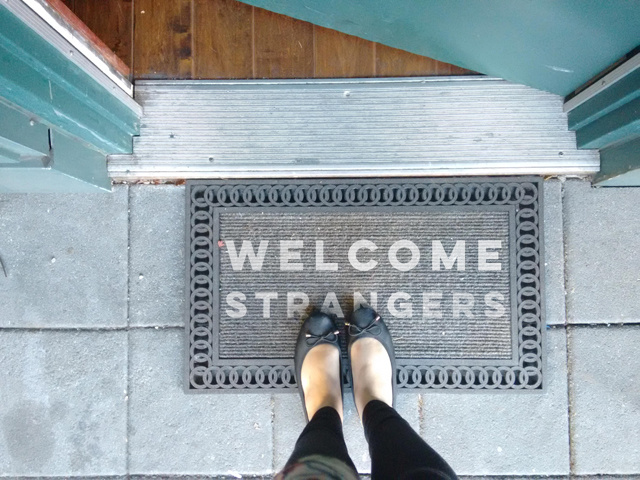LAUSANNE, Switzerland — The new wave of companies revolutionizing how we sleep in foreign cities and get rides home has sparked criticism from Oklahoma to New York to France. This criticism is sometimes very justified, such as the lack of requirement to have smoke detectors in any home being rented privately, or that some landlords use their properties solely as short-term rentals to make more money.
I’ve personally taken part in the hotel side of the sharing economy, and I’m often asked about my experiences both traveling and hosting on Couchsurfing and Airbnb. I have to admit that 95 percent of my experiences have been positive. When you choose your guests and hosts mindfully, most people are kind, honest and curious.
Couchsurfing launched in 2004, but I first learned about it in 2006 when I was living in San Francisco. A good friend, Matthew, brought one of his couchsurfers to a party. She was from France and was on an extended vacation, traveling the West Coast by herself, trying to improve her English. My friend explained that this was a website that allowed people to visit new cities, even if they didn’t know anyone who lived there, and experience them from a local’s point of view. The host was expected to provide advice, recommend places to go and often personally show the guest around, at least a little bit. The main goal was cultural exchange. The side benefit of free accommodation was downplayed as missing the point.
I couldn’t get my head around the concept. “So, you mean, you don’t know her, like at all? You just met her tonight? But she’s sleeping on your couch?”
The answer was yes. This friend would later go on to become the general manager of Couchsurfing.
The trust involved in this enterprise was staggering. You accepted strangers into your home on the principle that most people are honest and will treat your space as if it were their own.
Midway through 2008, I was applying for MBA programs in Europe and needed to visit the campuses for interviews, so I turned to Couchsurfing.
I knew right away I would stay only with girls. I was not about to go traveling in a foreign country by myself and stay with a man I had never met. Despite the whole basis of trust, that just seemed like a stupid idea.
Surfing couches in France, Italy and Switzerland
I was eventually accepted by Audrey in Paris, Sara in Milan, and Charlotte in Lausanne.
Audrey lived in the outskirts of Paris in a tiny one-bedroom apartment with her cat. She loaded me with maps and museum pamphlets, gave me the spare key and helped me figure out how to get the train to Fontainebleau, a small city about an hour outside of Paris.
While we were both in the apartment, we talked about our lives, cultural differences, the other guests she had hosted and how a concept as novel as Couchsurfing was actually an amazing study in human behavior. She was a great host, and we stayed friends for years afterwards.
My next host, Sara, had a more outgoing personality and really took it upon herself to show me a good time. She took me on a three-hour tour of Milan, pointing out the famous Duomo cathedral and making me spin around three times on the symbol of the bull in the Galleria Vittorio Emanuele to bring good luck. That night, she and her friends took me to a nightclub where we partied until the early morning.
In Lausanne, Charlotte also took me on a walking tour of the city and showed me the famous night watchman at the cathedral of Lausanne, the only night watchman still in existence in Europe who calls out every hour after dark that all’s well and there are no fires in town. Over beers, she talked about her belief in a non-violent world.
After receiving such kindness while traveling, I became determined to repay the debt. When I started the MBA program in Switzerland, my 300-square-foot studio apartment didn’t permit the kind of privacy needed to host properly. Instead, I listed myself as willing to show people around.
One of the first guests I took was a German student who had just moved to Lausanne and wanted to meet new people. His name was Felix, and he was renting a room from a grandmother in a small village miles outside of the city. I met him at the train station and began a walking tour of the best sites in Lausanne. He seemed nice, and was quite handsome, so we were having a good time together.
After a few hours, I invited him to a party, and he also came along to the bar after that. At a certain point, he realized he had missed the last train to be able to get home that night. I was suddenly faced with the kind of dilemma I had feared from this sort of adventure. Should I just say sorry and leave this person to sleep on a bench in the train station during a cold September night? Or should I swallow my fears and offer him the couch in my studio apartment? We had just spent the last 10 hours together, I had introduced him to at least a dozen of my closest friends, and he seemed completely non-threatening and more than a little naïve. I took him home.
What started off as an innocent offer to show a stranger around turned into much more than I ever expected. After that first night, our relationship turned romantic, and Felix and I dated on and off for more than a year and a half.
Couchsurfing changes and a new market option
For its first seven years, Couchsurfing served as an underground, little-known and often-misunderstood venture. That was when it was best. The people who used it were a small band of open-minded, curious misfits who wanted to experience new cultures.
In 2011, when Couchsurfing was unable to remain a non-profit and became a publicly listed, for-profit company, the rest of the world began to figure out that this was a way to travel for free and the membership exploded. The requests I received became hasty, impersonal and focused solely on free accommodation, with no mention of cultural exchange.
I stopped hosting.
It was not until 2013 when Airbnb gained legitimacy that I decided to get back into the sharing economy. I was living in a large, expensive apartment by myself with a spare bedroom that went mostly unused. The extra income couldn’t hurt, and it would make use of something otherwise wasted.
In the first year that I had my posting up, I received more than 70 inquiries from people wanting to stay. I accepted only 15 percent of them, picking and choosing the people I felt comfortable having in my house — mostly single girls traveling by themselves, or couples traveling together.
Problematically, I was getting an inordinate number of requests from businessmen who were traveling to Lausanne for work. They would normally ask to stay for four or five days, which meant a substantial amount of revenue on my side for a guest who would mostly be gone the whole day. I preferred to guess that Airbnb apartments were significantly cheaper than hotels and offered the benefit of access to a kitchen and living room that was not possible in most hotels. I preferred not to believe that there was an ulterior motive in requesting to stay with a single girl.
Still, I was extremely picky about who I chose, and I often double-checked stories on LinkedIn or through a Google search to make sure people really worked for the companies they said they did. I locked my bedroom door at night, of course, and often waited until the guest left for work (they mostly went in very early) before getting ready for the day.
Every one of my male guests was polite, clean, non-threatening and courteous. Although the money was fantastic, after two or three businessmen, I decided I just couldn’t do it. I felt too uncomfortable and awkward, so I went back to only accepting girls and, occasionally, couples.
Since then, I have also used Airbnb to travel myself, and the same rules apply – I only stay with women or with couples. I have been to Munich, Vienna and Bern, Switzerland, this way, and every experience involved kind, interesting and open people.
The sharing economy has opened up a whole new way to travel and experience the world, and has bolstered my faith in humanity. To see that thousands of people in hundreds of cities are willing to trust strangers openly and genuinely makes me believe most people are good at heart.
Just make sure you use common sense in the new sharing economy.






















